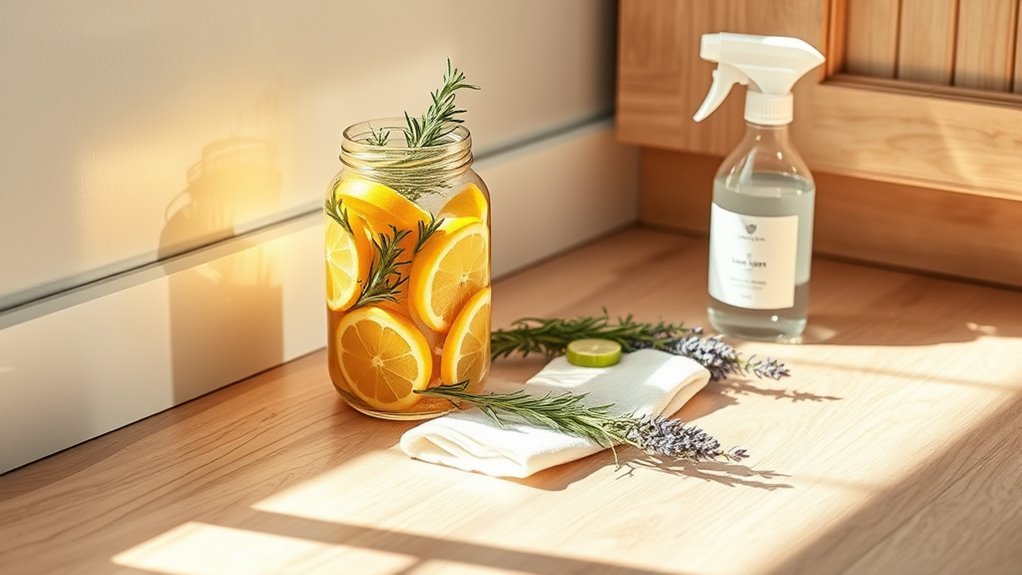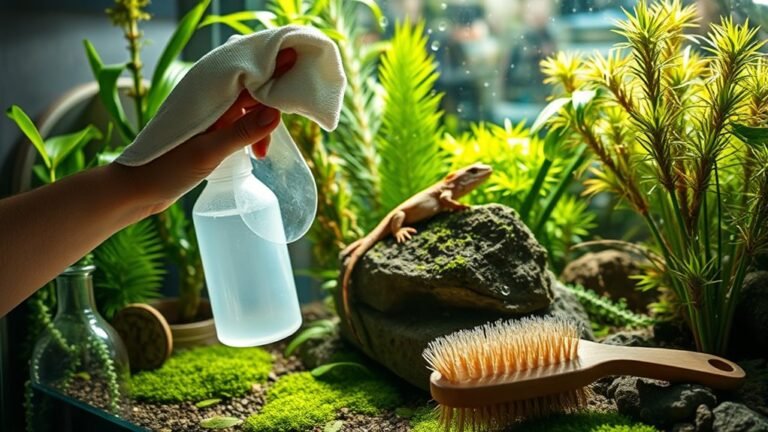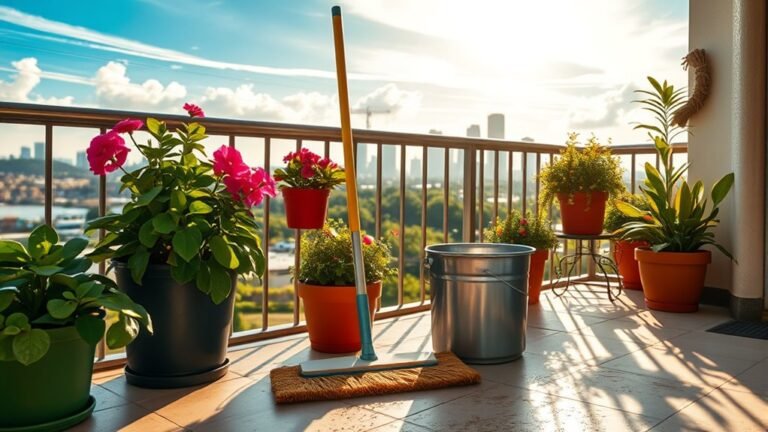Natural Cleaning Hacks for Your Pet Mess
You can tackle pet messes naturally by sprinkling baking soda on carpets or pet beds to absorb odors, then vacuuming after 15-30 minutes. For stains, use a diluted vinegar solution—spray, let it sit, then blot carefully. Lemon juice works wonders as a fresh-smelling disinfectant, and cornstarch can lift oils from carpets. You can also make natural enzyme cleaners or gentle sprays with essential oils that are safe for pets. Keep exploring these simple, safe tricks to maintain a fresh, clean home.
Using Baking Soda to Eliminate Odors
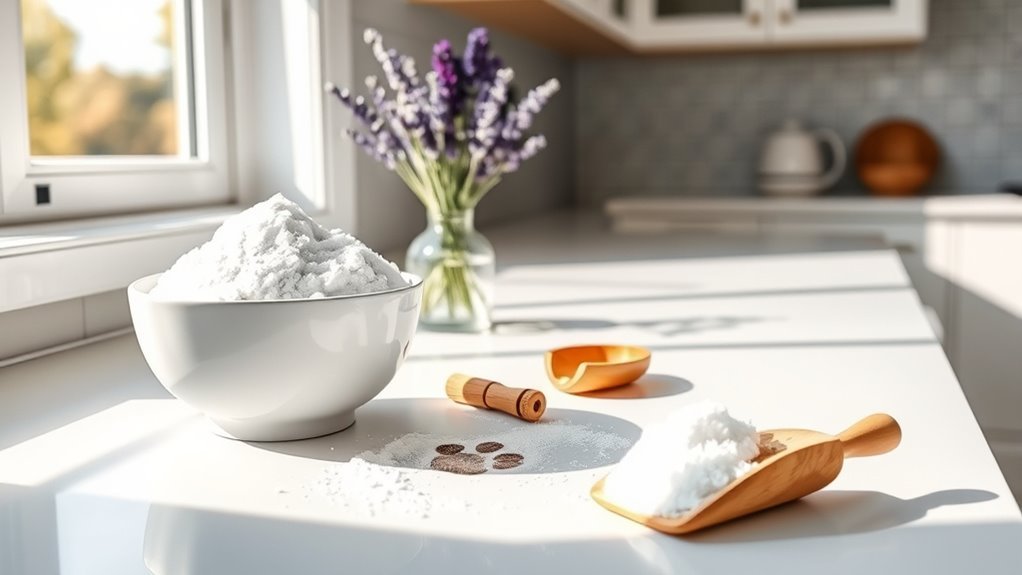
Though you might not realize it, baking soda is one of the most effective natural solutions for eliminating pet odors. You’ll love the baking soda benefits, especially its powerful odor absorption properties that work without harsh chemicals. When your living space starts smelling less fresh because of pet accidents or lingering smells, sprinkling baking soda on carpets, pet beds, or upholstery can quickly neutralize those unwanted scents. Just let it sit for 15 to 30 minutes before vacuuming it up. This simple hack gives you the freedom to maintain a clean, inviting home without relying on synthetic sprays or air fresheners. Using baking soda lets you take control naturally, keeping your space fresh and your pets happy, all while embracing a toxin-free lifestyle.
Vinegar Solutions for Stain Removal
You can combine vinegar with baking soda to tackle tough pet stains naturally. Knowing the right dilution ratios will help you clean effectively without damaging surfaces. Let’s explore some simple application tips to get those stains out quickly.
Vinegar and Baking Soda
One of the simplest and most effective natural solutions for pet stains combines vinegar and baking soda. You get the vinegar benefits—natural deodorizing and antibacterial power—while baking soda uses include lifting stains and neutralizing odors. Together, they create a fizzing action that breaks down tough messes without harsh chemicals.
Here’s how this dynamic duo works:
| Vinegar Benefits | Baking Soda Uses |
|---|---|
| Natural deodorizer | Absorbs odors |
| Antibacterial properties | Gentle abrasive for stains |
| Breaks down organic stains | Neutralizes acidic smells |
| Eco-friendly and non-toxic | Safe for pets and kids |
Using this combo frees you from chemical cleaners, so your home stays fresh and safe for your furry friends—true cleaning freedom!
Dilution Ratios Guide
When tackling pet stains with vinegar solutions, knowing the right dilution ratios is key to ensuring effective cleaning without harming surfaces or your pets. A common ratio to start with is one part white vinegar to one part water—this balance offers strong stain removal while being gentle enough for most flooring and fabrics. For more delicate materials, you might want to dilute further, using one part vinegar to two or three parts water. These dilution ratios help you customize your cleaning solutions, giving you control and freedom to freshen your space naturally. Remember, sticking to proper ratios prevents damage and keeps your pets safe. With the right mix, vinegar becomes a powerful ally in your natural cleaning toolkit.
Application Tips for Stains
Getting the vinegar solution just right is only part of the process; knowing how to apply it effectively makes all the difference in removing pet stains. Different stain types—whether urine, mud, or food—demand tailored approaches. For fresh stains, apply the vinegar solution immediately to prevent setting; for older, stubborn marks, let the solution sit for 10–15 minutes before blotting. Always test a small area first to verify no damage. Use a spray bottle for even coverage, then blot with a clean cloth—never rub, to avoid spreading. Adjust your cleaning frequency based on how often accidents happen; high-traffic spots might need daily attention, while less-used areas can be treated weekly. With this method, you’ll keep your space fresh and free from pet messes, all while embracing natural, effective cleaning.
Harnessing the Power of Lemon Juice
Anyone looking for a natural way to freshen up pet areas will find lemon juice incredibly effective. This citrus powerhouse acts as a natural disinfectant, cutting through odors and grime without harsh chemicals. You can squeeze fresh lemon juice directly onto stains or mix it with water to create a gentle cleaning solution. Its acidic nature helps break down tough residues while leaving a revitalizing scent behind. Plus, lemon juice is safe to use around your furry friends when diluted properly, giving you freedom from worry about toxic cleaners. Just remember to test a small spot first to avoid any discoloration. Embracing lemon juice means you’re choosing a simple, eco-friendly way to keep your home fresh and your pet’s messes under control.
Creating a Natural Enzyme Cleaner
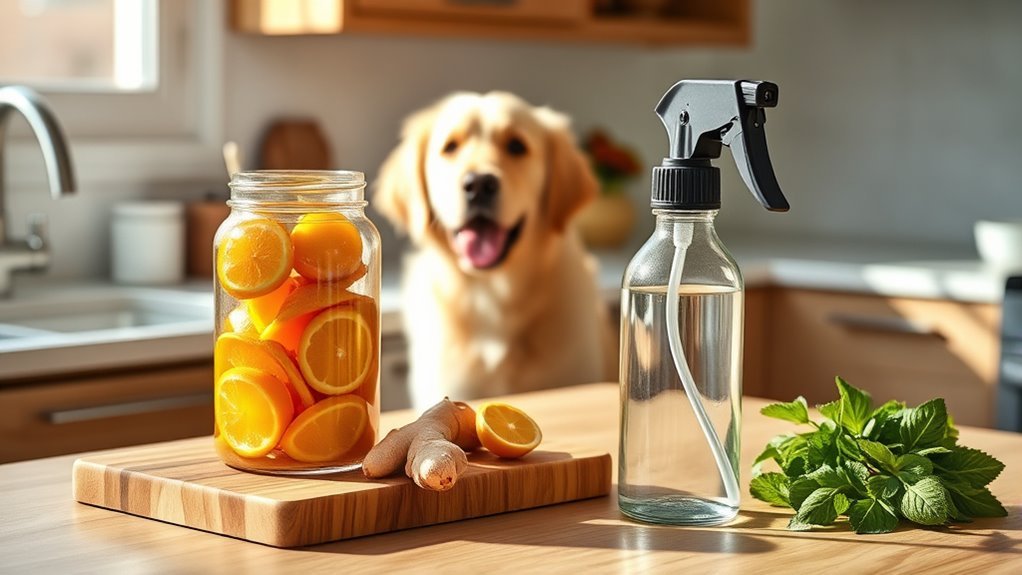
You can make a natural enzyme cleaner using simple ingredients like fruit scraps, sugar, and water. I’ll guide you through each step to prepare it correctly. Plus, you’ll learn the best ways to use it for cleaning up after your pets effectively.
Essential Ingredients Overview
Although natural enzyme cleaners might seem complex, you’ll find that their essential ingredients are simple and easy to source. To harness the power of nature, you’ll need a few staples like baking soda, white vinegar, and a bit of hydrogen peroxide. Hydrogen peroxide uses in cleaning go beyond stain removal; it helps break down organic matter effectively, making your cleaner potent against pet messes. Incorporating a small amount of coconut oil can boost the cleaner’s effectiveness too—the coconut oil benefits include natural antimicrobial properties that aid in deodorizing and sanitizing. These ingredients work together to create an enzyme-rich environment that breaks down stains and odors without harsh chemicals. With these basics, you’re free to tackle pet messes naturally, safely, and confidently.
Step-by-Step Preparation
Before you plunge into mixing your natural enzyme cleaner, gather all your ingredients and tools to streamline the process. Start with natural ingredients like citrus peels, brown sugar, and vinegar—these are your cleaning supplies’ powerhouse. Chop the citrus peels finely, then combine them with brown sugar and water in a jar. Seal it tightly to trap the natural enzymes inside. Let it ferment in a warm spot for about two weeks, shaking the jar daily to encourage enzyme activation. After fermentation, strain the liquid to separate the solids, and your enzyme cleaner is ready. Store it in a spray bottle for easy use. By prepping carefully, you guarantee your natural cleaner will break down pet messes effectively without harsh chemicals. Enjoy a fresh, eco-friendly cleaning experience!
Effective Application Tips
When applying your natural enzyme cleaner, it’s important to target the affected area thoroughly to guarantee pet stains and odors are fully broken down. Start by generously spraying the solution directly onto the mess, allowing it to soak in deeply. Use homemade scrubbers, like a soft brush or cloth, to gently agitate the surface without damaging it. This helps the enzymes penetrate and break down organic material effectively. After letting it sit for at least 15 minutes, blot the area with a clean cloth to lift residue. To keep your space fresh, follow up with natural air fresheners—like a lavender or citrus spray—to neutralize lingering odors without harsh chemicals. These simple steps free you from stubborn pet messes while keeping your home naturally clean.
Essential Oils for Freshening Up Spaces
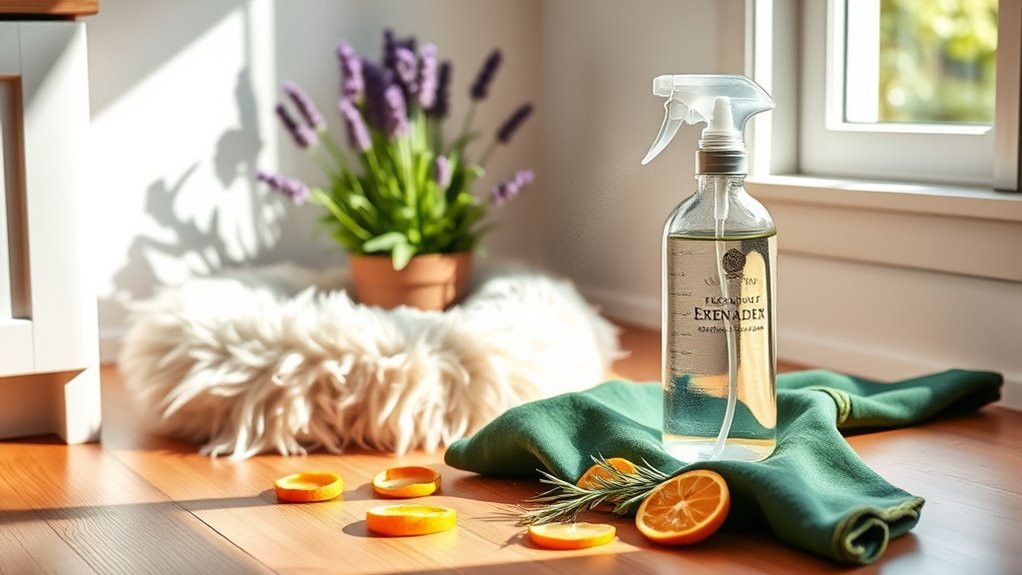
If you want to keep your pet’s space smelling fresh without harsh chemicals, essential oils offer a natural and effective solution. By using essential oil blends and scent diffusion, you can create a clean, inviting environment that’s safe for your furry friends. Just remember to choose pet-safe oils like lavender or chamomile and dilute them properly.
| Essential Oil | Benefits | Usage Tip |
|---|---|---|
| Lavender | Calming, deodorizing | Use in diffuser, dilute well |
| Lemon | Fresh, antibacterial | Add few drops to spray bottle |
| Chamomile | Soothing, fresh scent | Combine with carrier oil |
With these oils, you’re free to enjoy a naturally fresh home without compromising your pet’s health.
DIY Carpet Cleaning With Cornstarch
Although commercial carpet cleaners can be effective, you might prefer a natural alternative that’s safe for your pets. DIY carpet cleaning with cornstarch is a fantastic way to refresh your space without harsh chemicals. Cornstarch benefits include absorbing oils and odors, making it perfect for pet messes. Plus, it’s gentle on carpet texture, preserving softness and color.
Here’s how to reclaim your freedom from stubborn stains:
- Sprinkle cornstarch liberally over the affected area.
- Let it sit for 30 minutes to soak up oils and odors.
- Vacuum thoroughly to lift away dirt and residue.
This simple method keeps your carpets clean and your pets safe, giving you peace of mind and a fresh home environment.
Homemade Pet-Safe Disinfectant Sprays
Since many commercial disinfectants contain chemicals that can be harmful to pets, making your own pet-safe disinfectant spray is a smart choice. You can blend natural ingredients like white vinegar, water, and a few drops of essential oils such as lavender or eucalyptus—both known for their antimicrobial properties and pet safety. Mix equal parts water and vinegar in a spray bottle, add 10-15 drops of essential oil, and shake well before each use. This simple spray tackles germs without exposing your furry friends to harsh chemicals, giving you peace of mind while keeping your home fresh. Remember, always test a small area first and avoid using sprays directly on your pet. With this DIY solution, you’re free to maintain cleanliness without compromising pet safety.
Tips for Cleaning Pet Toys and Bedding
Keeping your pet’s environment clean goes beyond using safe disinfectants—you also need to pay attention to their toys and bedding. Proper pet toy care and bedding maintenance are key to keeping your furry friend healthy and happy. Here’s how you can stay on top of it:
- Wash bedding weekly in hot water with pet-safe detergent to eliminate odors and bacteria.
- Clean toys regularly by soaking them in a vinegar and water solution, then rinsing thoroughly to remove grime without harsh chemicals.
- Inspect for damage often; replace worn-out or torn toys and bedding to prevent choking hazards and discomfort.
Frequently Asked Questions
Can Natural Cleaners Harm My Pet if Ingested?
Oh, sure—because your pet’s just dying to take a sip of your homemade cleaner, right? But seriously, even natural cleaner ingredients can pose risks to pet safety if ingested. You want to keep your furry friend safe while enjoying the freedom of using eco-friendly products. Always check what’s inside your cleaner, avoid toxic substances like essential oils or vinegar in high amounts, and store everything out of reach to keep your pet happily free and healthy.
How Often Should I Clean Pet Messes With Natural Products?
You should aim for a cleaning frequency that keeps your space fresh without stressing you out—ideally, as soon as you notice a pet mess. Regular cleaning not only preserves your pet’s health by reducing bacteria and allergens but also keeps your home inviting. Using natural products means you can clean often without worrying about harsh chemicals, giving both you and your pet the freedom to enjoy a safe, clean environment every day.
Are Natural Cleaning Hacks Safe for All Pet Types?
You’ll want to guarantee the safe ingredients you choose won’t upset your pet’s sensitivities. While many natural cleaning hacks are gentle and effective, some pets might react differently depending on their species or allergies. Always test a small area first and keep your pet away during cleaning. This way, you can enjoy freedom in using natural products while keeping all your furry friends safe and comfortable.
How Do I Store Homemade Natural Cleaning Solutions?
You’ll want to use airtight storage containers to keep your homemade cleaning solutions fresh and effective. Glass or BPA-free plastic bottles work great since they won’t react with your ingredients. Don’t forget to add solution labels—include the date and contents so you can easily keep track. This way, you’re free to use your natural cleaners whenever needed without worry, staying organized and confident about what you’re spraying around your space.
Can Natural Cleaners Remove Pet Hair Effectively?
Think of pet hair as tiny clouds drifting around your space, stubborn yet manageable. You’ll find natural cleaners can’t whisk away pet hair alone, but combined with smart cleaning techniques—like using damp microfiber cloths or rubber gloves—they work wonders. These methods help you reclaim your freedom from constant shedding, making your home feel fresh without harsh chemicals. So, while natural solutions aid the process, it’s your technique that truly conquers pet hair.
